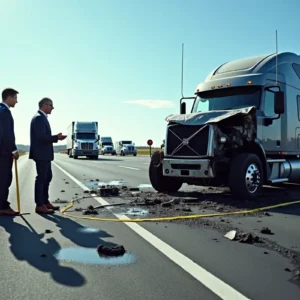For people riding bikes or driving smaller vehicles, truck accidents can be fatal. In fact, according to the Insurance Institute for Highway Safety (IIHS), 82% of truck crash fatalities are motorcyclists, pedestrians, and bicyclists.
Most motorists are at ease when they see big trucks driving through Albany. These large trucks carry materials needed by companies across the country. Sadly, they can also bring an additional risk of accidents, often including those that result in serious injuries.
However, recovering from accident injuries can take its toll on the victim. Firstly, the medical costs and rehabilitation are costly. Secondly, the victim will lose their earnings, and if the injuries are serious, future opportunities will also be missed. Fortunately, you can begin a truck accident claim process if the accident was no fault of your own and you are looking for fair compensation for the damages.
Keeping the roads safe should be the number one priority of a trucking company. The trucking business must follow the below points to keep their crew members and other drivers safe on the road.
Contents
Strictly Implement the Law
Following all FMCSA rules, including commercial registration and licensing, is crucial advice for trucking companies. Additionally, trucking businesses must adhere to all truck size and weight guidelines established by the United States Department of Transportation’s Federal Highway Administration. Loss of vehicle control, which can result from disregarding the rules, is one of the leading causes of trucking accidents recorded by both the FMCSA and legal specialists such as this Sacramento truck accident attorney.
Major vehicle accidents involving poorly maintained vehicles are fatal. Therefore, trucking businesses must ensure that drivers comply properly with FMCSA regulations before going on the road.
Embrace Appropriate Training
Trucking companies need to provide truck drivers with adequate training before they hit the road because of the following common factors that lead to truck accidents.
- Recognition: The truck driver is negligent, distracted, or neglects to pay attention to a crucial aspect of the road.
- Judgment: The truck driver drives recklessly, such as speeding, misjudging the speed of oncoming traffic, or following too closely.
- Implementation: Adverse reactions from the driver include panic, poor steering, and overcompensation.
Due to the above factors, proper training is essential to prevent these problems. Trucking companies can use extensive recruitment procedures to avoid hiring a driver with a bad driving record or an incompetent one. Also, ensure your drivers have the trucking permits for the cargo before going on a long route.
Concentrate on Safety Measures
Making as many deliveries as possible is often a company goal in the trucking industry. However, avoid compromising the driver’s comfort to enhance delivery. Driving while tired reduces attention span, delays reaction time, and impairs judgment, therefore, trucking businesses must impose rest requirements for drivers because driver fatigue is a high-risk crash factor. Furthermore, regularly reading the latest trucking news could also give you some insight into effective safety measures, lowering the risks of fatigue, and more. Focus more on the safety of truck drivers and other road users than delivering on time.
Additionally, trucking firms should teach their drivers to stay safe regardless of road conditions. There should be regulations on driving in bad weather, including instances where you should stop driving altogether. It’s also important to concentrate on the truck being road-safe, including implementing maintenance for air cooler cleaning, to ensure that the engines don’t overheat and provide improved air quality.
Trucking Communications
The risks of distracted driving have increased due to the usage of technologies like cell phones while driving. According to the Federal Communications Commission, 15 states prohibit smartphone use while driving, while 47 states prohibit texting. Generally, truck drivers are not allowed to text while driving under FMCSA regulations.
Therefore, trucking companies must create safety regulations to instruct drivers to pull over and stop if they need to communicate with someone other than a secure communication system for truck drivers. Trucking companies must implement fines if they find any truck driver guilty.
Trucking businesses should frequently verify safety procedures with their employees, conduct arbitrary driving assessments, implement driver drug testing, and solicit employee feedback on improved safety procedures. Safety should be a top priority for not only the driver but the trucking company as well.




